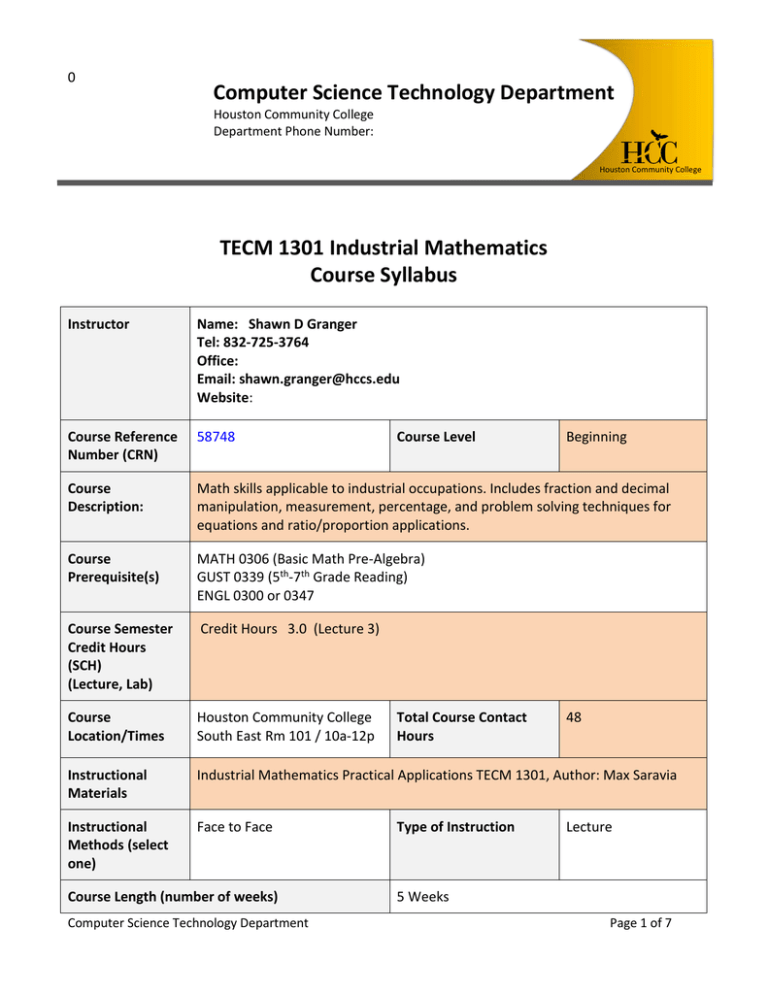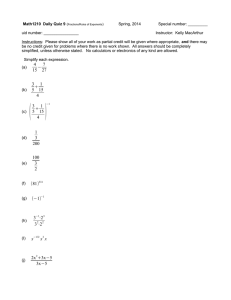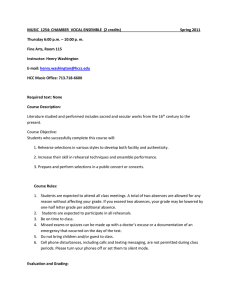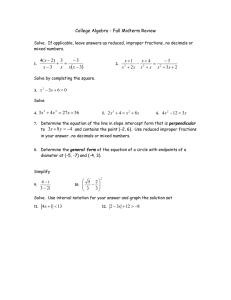Summer 2015 TECM 1301 Industrial Math 5WK 58748.doc
advertisement

0 Computer Science Technology Department Houston Community College Department Phone Number: ab Houston Community College TECM 1301 Industrial Mathematics Course Syllabus Instructor Name: Shawn D Granger Tel: 832-725-3764 Office: Email: shawn.granger@hccs.edu Website: Course Reference Number (CRN) 58748 Course Description: Math skills applicable to industrial occupations. Includes fraction and decimal manipulation, measurement, percentage, and problem solving techniques for equations and ratio/proportion applications. Course Prerequisite(s) MATH 0306 (Basic Math Pre-Algebra) GUST 0339 (5th-7th Grade Reading) ENGL 0300 or 0347 Course Semester Credit Hours (SCH) (Lecture, Lab) Credit Hours 3.0 (Lecture 3) Course Location/Times Houston Community College South East Rm 101 / 10a-12p Instructional Materials Industrial Mathematics Practical Applications TECM 1301, Author: Max Saravia Instructional Methods (select one) Face to Face Course Length (number of weeks) Computer Science Technology Department Course Level Total Course Contact Hours Type of Instruction Beginning 48 Lecture 5 Weeks Page 1 of 7 Course Requirement, Policy, and Course Calendar Instructor Grading Criteria Class Participation 300 30% Quiz (7x50) 350 35% Midterm Examination 250 15% Final Examination 100 20% Total Possible Points 1000 Total Percentage 100% *Student’s if you are unable to attend class, it is mandatory that you contact me ASAP via email. My contact information is listed in front of the syllabus.* Good Luck! Tentative Course Schedule: Week of 1 1 Topics COURSE RULES AND ORIENTATION • Purpose of the course • Overview of course syllabus • Course policies • Required materials, textbook(s), supplies, and resources (if applicable) • Disability Support Services • Registration, schedules, receipts, and student ID • Importance of updating and maintaining student data (Name, Address, ID #, phone numbers, emails) • Parking rules and regulations • Classroom and laboratory safety • Course withdrawal, Official Day of Record, and last day for withdrawal • Course tests, quizzes, exams, and assignments • Course grading policies • Instructor information • Campus orientation BASIC MATHEMATICAL CONCEPTS • Operations With Whole numbers Computer Science Technology Department Page 2 of 7 Review Operations with Fractions • Introduction to Fractions • Addition and Subtraction of Fractions • Multiplication and Division of Fractions The U.S. System of Weights and Measures 2 DECIMALS • Addition and Subtraction of Decimals • Rounding Numbers • Multiplication and Division of Decimals Percent 2 3 3 Review of Operations with Decimal Fractions and Percent • Ratio, Rate, and proportions • Given percentage of a number • Advance Percent Problems Signed Numbers, EXPONENTS AND SCIENTIFIC NOTATIONS • Operations with signed numbers • Introduction to exponents • Signed Numbers, EXPONENTS AND SCIENTIFIC NOTATIONS Exponents and scientific notation • Prefixes using exponents: kilos, mega, milli, micro. • Problems involving exponents and prefixes METRIC SYSTEM • English System of units • SI system of units • Unit conversions 4 GEOMETRY AND TRIGONOMETRY • Basic geometry • Perimeters, areas, and volumes of common solid shapes • Triangles and their properties • Pythagorean Theorem • Basic trigonometry functions 4 Computer Science Technology Department Page 3 of 7 GEOMETRY AND TRIGONOMETRY Continued Final Exam Review 5 Final Examination Learning Objective, Students Learning Outcome and Program Spec Note: This section of the syllabus provides the general course learning objectives, the expected students learning outcome, the course scope in terms of the department program, and the instrument used to evaluate the course. If you have any question, contact the instructor or the department. HCC Grading Scale Grade A = 100- 90 B = 89 - 80: C = 79 - 70: D = 69 - 60: 59 and below = F Course Student Learning Outcomes (SLO): GPA Points 4 points per semester hour 3 points per semester hour 2 points per semester hour 1 points per semester hour 0 points per semester hour Perform operations using addition, subtraction, multiplication and division. Perform operations using fractions, and mixed numbers. Convert between decimals and fractions and vice versa. 1. Utilize a calculator to perform operations involving fractions and decimals. 2. Utilize percentages to solve problems encountered in industrial environments. 3. Use measuring tools and interpret and determine information in drawings and diagrams using fractions and decimals. 4. Convert unit values. 5. Calculate ratios in a technical application. 6. Compute percentages utilizing ratio and proportions. 7. Calculate proportions in a technical application. 8. Calculate areas and volumes of geometric solids. 9. Transpose linear equations to solve for unknowns. 10. Solve simple equations 11. Convert English units to SI units and vice versa. 12. Utilize concepts of geometry to determine perimeters, areas and volumes, and use formulas to solve problems. Computer Science Technology Department Page 4 of 7 Program/Discipline Requirements: Students are required to enroll in TECM 1301 along with or prior to other discipline courses (e.g. Welding, Electricity, Air conditioning). Students are not allowed to graduate if they withdraw from TECM 1301. Students who stop attending class and do not withdraw from the course will receive an FX grade. Students attempting advanced certificates are strongly advised that for most advanced courses student must be placed in MATH 0308. HCC Policy Statement Access Student Services Policies on their Web site: 1. Attendance Students are expected to attend classes regularly, and to be on time for every class period. Students can be dropped from a class due to excessive absences. Excessive tardiness may be considered absences. Students are responsible for subjects, assignments, and projects covered during their absences. Consult the Student Handbook for more details or visit http://www.hccs.edu/hccs/current-students. 2. Academic Honesty Scholastic dishonesty is treated with the utmost seriousness by the instructor and the College. Academic dishonesty includes, but it is not limited to the willful attempt to misrepresent one’s work, cheat, plagiarize, or impede other students’ scholastic progress. Consult the Student Handbook for more details. 3. Students with Disabilities The Disability Support Services Office (DSSO) assists students with physical, learning, or emotional disabilities in developing independence and selfreliance. Students with Disabilities are urged to contact the DSSO at least 30 to 60 days prior to the first day of class. The goal is to ensure that students with disabilities get off to a good start and have the support necessary for them to succeed. The DSSO are committed to compliance with the Americans with Disabilities Act (ADA) and Rehabilitation Act of 1973 (section 504). Student can contact DSSO by phone at 713.718.6164 - TTY 713.718.6335. Fax 713.718.1468 4. Classroom and Laboratory Conduct Proper behavior is expected in all classes and laboratories. Foul language and horseplay are not allowed. Making or receiving cell phone calls during class are not allowed. Sleeping in class is not allowed. 5. Course Withdrawal It is the responsibility of the student to officially withdraw from a course Computer Science Technology Department Page 5 of 7 before the official withdrawal deadline. A student who does not withdraw from a course by the deadline will receive an “F” as the final grade. Also note that under Section 51.907 of the Texas Education Code, an institution of higher education may not allow a student to drop more than six courses. 6. Course Repeater Policy: Beginning in the fall 2006, students repeat a course for a third or more times will face significant tuition/fee increases at HCC and other Texas public colleges and universities. Please ask your instructor and/or counselor about opportunities for tutoring/other assistance prior to considering course withdrawal or if you are not receiving passing grades. 7. Cell Phones All cell phones must be muted, set to vibrate, or turned off during class. Cell phone activity during class is deemed disruptive to the academic process and will not be tolerated. If you need to make or receive an Emergency Call, please leave the classroom. 8. Calculators If the course allows the use of a calculator during class, lab projects, and exams, the student is responsible to bring his/her calculator. Cell phones are not calculators, and are not allowed to be used for that purpose during class, tests, or exams. 9. Student ID Students are required to obtain a Student ID. For additional information, consult the Student Handbook. 10. Parking Rules and Regulations Students are required to follow HCC’s regulations regarding parking and permits. For additional information, visit http://www.hccs.edu/hccs/abouthcc/police/parking/parking-rules-and regulations 11. Books, Tools and Supplies Students are required to purchase and bring to class the required textbooks, tools, notebooks, supplies, and writing instruments as required by the instructor. 12. Dress Code Dress code must be appropriate for the class. Students must dress in a way that clothing and accessories do not compromise their safety, and the safety of others. Proper foot wear is required in all laboratories. Absolutely no sandals or other footwear that exposes the feet will be allowed. 13. Classroom and Laboratory Conduct Proper behavior is expected in all classes and laboratories. Foul language Computer Science Technology Department Page 6 of 7 and horseplay are not allowed. Making or receiving cell phone calls during class are not allowed. Sleeping in class is not allowed. 14. Course Withdrawal It is the responsibility of the student to officially withdraw from a course before the official withdrawal deadline. A student who does not withdraw from a course by the deadline will receive an “F” as the final grade. Also note that under Section 51.907 of the Texas Education Code, an institution of higher education may not allow a student to drop more than six courses. Distance Education and/or Continuing Education Policies Access DE Policies on their Web site: http://de.hccs.edu/de/de-student-handbook Access CE Policies on their Web site for noncredit classes: http://hccs.edu/CE-student-guidelines Computer Science Technology Department Page 7 of 7





